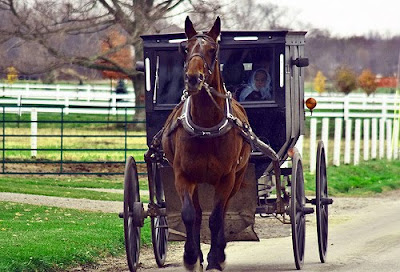Part Five: The Importance of Religion
It should be obvious that religion is important to the Amish, since their way of dress alone is evidence of a different faith and way of life. The religious function of the family is not only reinforced by prayers at meals, family devotion, etc., but during worship itself.
As the Amish go from house to house for church every other Sunday, their religion remains literally in the home. The family is not split up and sent to different rooms for Sunday School. Indeed, Sunday Schools, which separated children from parents and made "teaching religion" more institutional, were one of the causes behind the formation of the Old Order groups.
At an Amish church service, everyone sits through the three hour plus service together in connecting rooms, although men and women are separated. Small children are passed back and forth, or walk between father and mother during the service. Worship is a family affair in the home.
Children also see their parent’s faith in practice (or not in practice) on a daily basis. Many Amish writings stress the importance of the example set by parents. The Amish often quote Proverbs in the Bible, "Train up a child in the way he should go and when he is old he will not depart from it."
All of this is part of the integration of the religion and family in the personal life of the individual and the community. The ordnung or ordinances of the church, sometimes seem unnecessarily picky to outsiders.
But as Dr. Donald Kraybill notes in his Riddle of Amish Culture, the ordnung...
"regulates private, public, and ceremonial life... Rather than a packet of rules to memorize, the Ordnung is the ‘understood’ behavior by which the Amish are expected to live... Children learn the Ordnung from birth by observing adults and hearing parents and others talk about it. It gradually becomes the definition of reality, ‘the way things are,’ in the child’s mind."
The pervasiveness of religion and ordnung is so strong that it is sometimes overlooked as the cement that keeps Amish culture together. Some say the Amish, rather than having a religion based on faith, have one of outmoded traditions and ideas, many of which they cannot even explain. Others find shunning unnecessarily harsh. Amish communities sometimes fragment over seemingly trivial issues to the non-Amish outsider. Others see the Amish lifestyle as an idyllic return to "basic values, " missing the religious order behind it all.
Some have joined the Amish faith from outside, but this attraction often comes from what they see superficially of the Amish and their way of life. Those expecting high theological discussions of the faith are disappointed.
Amish expert Dr. John Hostetler writes in his book Amish Society that...
"the greatest difficulties for those who try to join the Amish are: the hard manual labor, learning to accept responsibility willingly, and developing the ability to understand directions communicated in a nonverbal way. For a young man who is a prospective convert, Amishness begins with the stable and a pitchfork. For the young girl, it begins with the work at hand."
One discovers what it means to be Amish by being and participating, not by theory and theological discourse. But this simply means that the religion, lifestyle, and culture are so intertwined that by attempting to dissect them, we destroy the concept of the whole.
In Amish life, there is much concern over the submission of the individual to the community and to the Church. Indeed, Dr. Kraybill finds the answers to much the Amish do in the word gelassenheit, which he defines as "submission," or yielding to a higher authority. The noted Amish expert, Dr. John Hostetler, once noted bluntly in a lecture that among the Amish "self-pride stinks." One does not find it uncommon to read articles by the Amish about "breaking the will" of small children.
I observed this first-hand when I ate with an Amish family several years ago. The one and a half-year-old boy was being stubborn by not putting his hands under the high chair tray during prayer before and after the meal. Of course, he was too young to know why this was a necessary prelude to eating. Consequently, we sat through periods of screaming fits from time to time. But through patient and determined work by the parents at every meal, which sometimes involved holding him and his hands down, he eventually understood that this had to be done. This was a step in breaking the will, but through it all love and affection were lavished on the children, even amid concern that perhaps they were being spoiled.
What one feels in Amish society is a sense of place, position, and belonging. While some may view aspects of this as stifling or detrimental, others find in it a sense of contentment and security. The Amish speak of the individual subordinating himself to the family, the church, the group. In doing this, however, he also receives much in return. Published with permission from www.Amishcountrynews.com



